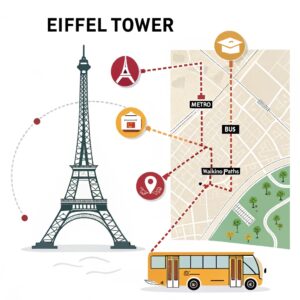Directions and Transportation Guide
The Eiffel Tower, located in the heart of Paris, is one of the most iconic landmarks in the world. Standing tall at 330 meters (1,083 feet), this architectural marvel attracts millions of visitors every year from around the globe. Whether you’re visiting Paris for the first time or are a regular tourist, knowing how to get to the Eiffel Tower efficiently is key to ensuring you make the most of your visit.
This comprehensive guide provides detailed directions and transportation options to help you reach the Eiffel Tower smoothly and easily. From the nearest metro stations to the best taxi routes and even walking paths, we’ll cover it all to help you navigate Paris and arrive at the Eiffel Tower hassle-free.
1. Overview of the Eiffel Tower’s Location
The Eiffel Tower is situated on the Champ de Mars, a large public greenspace in the 7th arrondissement of Paris. Its coordinates are approximately 48.8584° N latitude and 2.2945° E longitude, making it centrally located and easily accessible from various parts of the city.
Because the Eiffel Tower is one of the most visited tourist attractions in the world, there are numerous ways to reach it from different parts of Paris. The city has an excellent public transportation system, including metro lines, buses, and trams, all of which provide convenient access to this iconic monument.
2. Directions to the Eiffel Tower by Public Transportation
Public transportation in Paris is a convenient and cost-effective way to get to the Eiffel Tower. Whether you’re traveling from Gare du Nord, Champs-Élysées, or the Louvre Museum, Paris’s public transit system will get you there in no time. Here are the most popular and efficient modes of public transportation.
2.1. By Metro
The Paris Metro is one of the quickest ways to get to the Eiffel Tower. The closest metro station to the Eiffel Tower is Bir-Hakeim Station on Line 6, which is just a short walk from the tower. This station offers easy access to the Champ de Mars park and provides a beautiful view of the Eiffel Tower from the platform.
- Metro Station 1: Bir-Hakeim Station (Line 6)
Distance to the Eiffel Tower: 10-minute walk
Key landmarks nearby: Trocadéro, Champ de Mars, River Seine
Bir-Hakeim Station is the closest metro station to the Eiffel Tower, and it’s one of the most convenient stops for visitors coming from areas like Montparnasse or Gare Montparnasse. - Metro Station 2: Ecole Militaire Station (Line 8)
Distance to the Eiffel Tower: 10-12 minutes’ walk
Ecole Militaire Station is another great option for those coming from the Louvre or Opéra Garnier. The route from here provides a pleasant walk along tree-lined streets, bringing you close to the Champ de Mars park.
2.2. By RER
The RER C line is another excellent way to reach the Eiffel Tower. The RER C station at Champ de Mars – Tour Eiffel is located just a few steps from the tower, providing easy and direct access. This route is especially convenient if you’re coming from Gare d’Austerlitz or Gare de Lyon.
- RER Station: Champ de Mars – Tour Eiffel (RER C)
Distance to the Eiffel Tower: 2-minute walk
The Champ de Mars – Tour Eiffel station provides the most direct route to the tower, making it ideal for tourists traveling from central stations like Gare Montparnasse, or coming from the Versailles Palace.
2.3. By Bus
Several buses stop near the Eiffel Tower, making it a viable option for those wishing to explore the city as they travel. The buses that pass by the Eiffel Tower include routes 42, 69, 72, and 82.
- Bus Station: Tour Eiffel (Line 42, 69, 72, 82)
Distance to the Eiffel Tower: Immediate access
Bus routes traveling to and from the Eiffel Tower are convenient for tourists coming from Le Marais, the Latin Quarter, or Montmartre. These buses typically make stops at various tourist attractions, so they can be great for exploring multiple parts of Paris.
2.4. By Tram
Paris also has an extensive tram network, which offers a scenic way to travel to the Eiffel Tower. The Tram Line 3 has a stop at Pont du Garigliano near the Eiffel Tower, which is easily accessible by a short walk through the Jardin des Serres d’Auteuil.
- Tram Station: Pont du Garigliano (Tram Line 3)
Distance to the Eiffel Tower: 15-minute walk
Taking the tram gives visitors a chance to enjoy some of the more peaceful parts of Paris, especially near the Jardin des Serres. Tram routes may be a slower option compared to other transportation modes, but it’s great for those looking for a more relaxed journey.
3. Getting to the Eiffel Tower by Taxi
While public transportation is reliable, some travelers may prefer the comfort and convenience of taking a taxi to the Eiffel Tower. The journey by taxi can be more direct and faster, especially if you’re coming from farther away or with luggage. Paris has an abundance of taxis available, and they can be hailed from most city streets or booked in advance via a taxi app.
- Taxi Pick-Up Points Near the Eiffel Tower
You can easily find a taxi drop-off point at the base of the Eiffel Tower, with several taxi stands located nearby, such as on Avenue de la Bourdonnais and Avenue Gustave Eiffel. Taxis typically cost more than public transportation, but it’s a great option for those seeking door-to-door service. - Estimated Taxi Fare
A taxi ride from Gare du Nord to the Eiffel Tower typically costs around €15–€20, depending on traffic. From the Champs-Élysées to the Eiffel Tower, expect to pay around €10–€15.
4. Walking to the Eiffel Tower
If you’re staying nearby or want to enjoy Paris on foot, walking to the Eiffel Tower is a wonderful option. The tower is centrally located and can be reached by walking through several beautiful districts, parks, and streets.
Walking Routes to the Eiffel Tower
- From Trocadéro: Walking from Trocadéro Gardens offers some of the best views of the Eiffel Tower. As you approach the tower, you’ll pass by the Fountains of Trocadéro, which create a stunning visual display against the monument.
- From Champ de Mars: If you’re already near the Champ de Mars park, the Eiffel Tower is just a few minutes’ walk. The tower’s gardens make for a pleasant stroll, especially as you approach it in the evening when it’s illuminated.
Walking gives you the chance to enjoy Paris at a leisurely pace while admiring some of the city’s most famous streets and squares along the way.
5. Bike Rentals and Cycling Routes
Paris is a bike-friendly city, and there are several places where you can rent bikes to get to the Eiffel Tower. The Velib’ bike-sharing system allows you to pick up a bike from any station and return it at another.
Cycling Routes to the Eiffel Tower
- Cycling from the Seine: There are cycling paths along the Seine, which provide a scenic and pleasant route to the Eiffel Tower. The bike ride offers incredible views of Paris, including famous bridges like the Pont Alexandre III.
Cycling to the Eiffel Tower is an environmentally friendly and fun way to travel, and it also offers an immersive experience of the Parisian landscape.
6. Special Considerations for Tourists with Disabilities
For tourists with disabilities, the Eiffel Tower is fully accessible. The monument provides elevators to all floors, ensuring a smooth and comfortable visit. RER and metro stations near the Eiffel Tower also offer wheelchair access. Additionally, taxis and buses in Paris are increasingly wheelchair accessible, making getting around more convenient.
7. The Best Routes from Popular Landmarks
The Eiffel Tower is well connected to many other top tourist attractions in Paris. Here are the best ways to travel from some of the most popular sites to the Eiffel Tower:
- From the Louvre Museum: Take Metro Line 1 to Concorde, then transfer to Line 6 at La Motte-Picquet – Grenelle station, and head to Bir-Hakeim Station for the closest metro stop.
- From Notre-Dame Cathedral: You can take Metro Line 4 from Saint-Michel station to Strasbourg-Saint-Denis, and then transfer to Line 6 at Barbès-Rochechouart. Then get off at Bir-Hakeim or Ecole Militaire.
- From Montmartre: Take Metro Line 2 from Anvers or Pigalle to Barbès-Rochechouart, then transfer to Line 6 to Bir-Hakeim Station.
8. Tips for Visiting the Eiffel Tower
- Arrive Early or Late: To avoid the crowds, it’s best to visit the Eiffel Tower early in the morning or later in the evening, especially if you want to catch the sparkling light show.
- Book Tickets in Advance: To skip the lines, book your Eiffel Tower tickets online in advance. This will save you time and help ensure you get the best viewing time.
- Wear Comfortable Shoes: Whether you plan to walk or take public transportation, wear comfortable shoes as you’ll be walking and standing a lot.
9. Conclusion: Plan Your Visit to the Eiffel Tower with Ease
The Eiffel Tower is one of the most visited monuments in the world, and getting there is easier than you might think. With a variety of transportation options—whether by metro, bus, taxi, or even on foot—visiting the Eiffel Tower is straightforward and stress-free. Whether you’re staying in central Paris or coming from farther away, this guide will help you navigate your way to the Eiffel Tower with ease.
FAQ On Getting to the Eiffel tower
1. How do I get to the Eiffel Tower from the airport?
Answer:
From Charles de Gaulle Airport (CDG), take RER B to Gare du Nord, then transfer to Metro Line 6 to Bir-Hakeim Station, which is the closest metro station to the Eiffel Tower. Alternatively, from Orly Airport, take Orlyval to Anthony, then transfer to RER B and follow the same route as above.
2. Which metro stations are closest to the Eiffel Tower?
Answer:
The two closest metro stations to the Eiffel Tower are:
- Bir-Hakeim Station (Line 6)
- Ecole Militaire Station (Line 8)
Both stations are about a 10-minute walk to the tower.
3. Can I take the RER to the Eiffel Tower?
Answer:
Yes, you can take the RER C line to Champ de Mars – Tour Eiffel station, which is the most direct station to the tower. It’s just a short 2-minute walk to the Eiffel Tower from this station.
4. How much does a taxi ride to the Eiffel Tower cost?
Answer:
Taxi fares vary depending on your starting location and the traffic conditions. From central areas like Champs-Élysées, the ride typically costs around €10–€15. From Gare du Nord, the fare is around €15–€20.
5. Is it easy to walk to the Eiffel Tower from other parts of Paris?
Answer:
Yes, walking to the Eiffel Tower is quite easy if you are staying nearby. From locations like Trocadéro, the walk is just 15 minutes, offering fantastic views of the tower along the way. Walking from central locations like the Louvre or Notre-Dame can take around 30 minutes to 1 hour.
6. How do I get to the Eiffel Tower from the Louvre Museum?
Answer:
From the Louvre Museum, take Metro Line 1 to Concorde, then transfer to Line 6 at La Motte-Picquet – Grenelle station. Get off at Bir-Hakeim Station, which is the closest metro stop to the Eiffel Tower.
7. Are there any buses that go to the Eiffel Tower?
Answer:
Yes, several buses pass near the Eiffel Tower, including lines 42, 69, 72, and 82. They stop at Tour Eiffel bus stop, which is just a short walk from the monument.
8. Is there a tram route to the Eiffel Tower?
Answer:
Yes, you can take Tram Line 3 and get off at Pont du Garigliano tram station. From there, it’s about a 15-minute walk to the Eiffel Tower through the Jardin des Serres d’Auteuil.
9. What is the best route from Montmartre to the Eiffel Tower?
Answer:
From Montmartre, take Metro Line 2 from Anvers or Pigalle to Barbès-Rochechouart, then transfer to Line 6 at Place de Clichy. Ride until Bir-Hakeim Station, which is close to the Eiffel Tower.
10. Can I get to the Eiffel Tower by bike?
Answer:
Yes, Paris is a bike-friendly city, and you can use the Velib’ bike-sharing system to rent a bike. There are bike paths along the Seine River, which offer scenic routes to the Eiffel Tower, making it a great option for cycling.
11. How long does it take to reach the Eiffel Tower by metro?
Answer:
The time it takes to reach the Eiffel Tower by metro depends on your starting point. From Gare du Nord, the journey usually takes about 20-30 minutes. From Champs-Élysées, it takes around 15-20 minutes.
12. Can I reach the Eiffel Tower from the Seine River by boat?
Answer:
Yes, you can take a Seine river cruise, which typically passes by the Eiffel Tower. Several boat tours provide stops near the Eiffel Tower, making it a scenic and relaxing way to reach the landmark.
13. Is there a direct route to the Eiffel Tower from Gare Montparnasse?
Answer:
Yes, from Gare Montparnasse, you can take Metro Line 6 directly to Bir-Hakeim Station, which is a short walk to the Eiffel Tower. The entire journey takes about 15-20 minutes.
14. Are there any walking tours that include the Eiffel Tower?
Answer:
Yes, many walking tours in Paris include a visit to the Eiffel Tower. These tours usually cover Trocadéro, Les Champs de Mars, and the surrounding areas, offering a comprehensive experience of the tower and its history.
15. How can I avoid long lines at the Eiffel Tower?
Answer:
To avoid long lines, book tickets in advance online. Also, try to visit the Eiffel Tower early in the morning or later in the evening, as these times tend to have fewer crowds. If you prefer to skip the queues, consider purchasing skip-the-line tickets for priority access to the monument.



